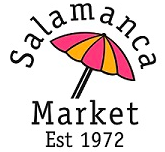Building Greener Markets in Tasmania, Australia
Salamanca Market is working hard to become more sustainable and environmentally friendly.
This is no small challenge as the market is the most visited tourist attraction in Tasmania, attracting up to 980,000 visitors annually resulting in more than a tonne of waste in the bins around the market each Saturday.
Our commitment not only extends to becoming a leader in responsible tourism, but also to preserving our island state, our clean air and our clean waters.
"Salamanca Market has introduced a new organics waste stream. This exciting change will see more than 24 tonnes of compost (around half of the weekly waste generated through the market) diverted away from Hobart’s landfill every year. New compostable waste bins, sporting a green lid and signage are collecting food scraps, coffee cups (including lids), cutlery, straws and hot food takeaway containers.
Salamanca Market's compostable waste is taken to the McRobies Gully Waste Management Centre (the tip) at South Hobart. It takes around three months to break down to become Certified Organic Compost and the City sells this as quality garden compost to the general public. The compost is also used extensively in our city parks and gardens."
"Recycling bins
Recycling bins have been used for many years at the market and the market already diverts more than 20 tonnes of recycling each year through our yellow recycling bins.
General waste
Our goal is to reduce the amount of general waste that goes into our red bins and we will be closely monitoring the contents of these bins to ensure our signage and communications are working.
Cardboard bins for stallholders
Stallholders can now place all cardboard boxes in our designated large collection bins.
No more plastic bags
Salamanca Market is now proudly a plastic bag free market.
Take away food
All of our food stallholders are changing over to Certified Compostable Packaging. Over time, all takeaway food containers will be compostable and environmentally friendly including coffee cups, straws and food containers."
External source(s)
Image

Salamanca Market
Project start date
10/02/2020
Project end date
10/02/2020

